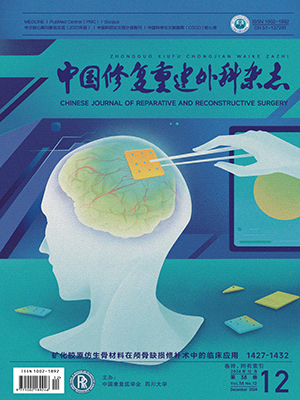OBJECTIVE: To explore the effect of Fas/Apo-1 and Bcl-2 gene expression on mechanism of scar formation. METHODS: Immunohistochemical method was applied to defect the expression of Fas and Bcl-2 protein in fibroblasts from 10 cases with normal skin, 10 cases with hypertrophic scar and 10 cases with keloid. RESULTS: The positive expression rate of Bcl-2 protein in keloid was 83.2%, significantly higher than that in hypertrophic scar (38.6%), (P lt; 0.01), and the positive expression rate in hypertrophic scar and keloid was higher than that in normal skin (6.78%), (P lt; 0.01). But the positive expression rate of Fas/Apo-1 protein was 78.4% in normal skin 80.4% in hypertrophic scar, 84.4% in keloid respectively, which showed no significant difference among them (P gt; 0.05). CONCLUSION: Bcl-2 gene but Fas gene may take part in the formation of pathologic scar.
Citation: LIU Yong,REN Linsen,cEN Ying.. EXPERIMENTAL STUDY OF BCL-2 AND FAS GENE EXPRESSION IN FIBROBLAST OF SCAR. Chinese Journal of Reparative and Reconstructive Surgery, 2001, 15(6): 351-353. doi: Copy
Copyright © the editorial department of Chinese Journal of Reparative and Reconstructive Surgery of West China Medical Publisher. All rights reserved




